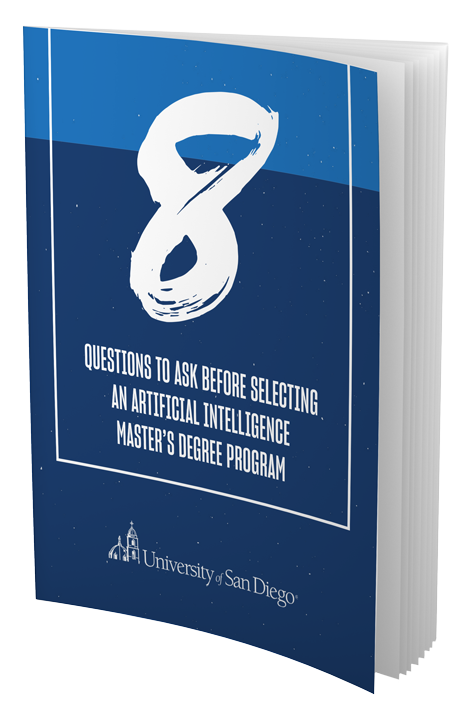Artificial intelligence (AI) has emerged as a transformative force in every major industry. Virtual assistants, image recognition, recommendation systems (on streaming services and social media) and healthcare diagnostics are just a few common uses.
Though AI is defined as “the capacity of computers or other machines to exhibit or simulate intelligent behavior,” humans still play a crucial role developing, deploying and monitoring systems to ensure they are serving society ethically.
So, where do you begin your future in AI? An artificial intelligence degree is a strong starting point. This blog post will spell out helpful skills and educational options, as well as career opportunities.
Key Skills and Interests of Artificial Intelligence Degree Earners
The speed at which AI is transforming industries shows no signs of slowing, meaning workers need to be up for learning at a speedy, if not lightning-fast, pace. Here are a few key skills of artificial intelligence degree earners:
Analytical insight
The ability to meaningfully consider complex problems and come up with their solutions. AI professionals find that some knowledge and experience with calculus and linear algebra are helpful.
Passion for technology and programming
Python, R, Java, C and Matlab are a few programming languages that AI professionals should be enthusiastic about working with.
Curiosity
A continuous learning mindset is necessary to keep up with AI as it quickly evolves.
Problem-solving
It is helpful for AI professionals to enjoy working on challenging issues, as the majority of their job centers on new technology.
Creativity
Innovation is the basis of AI, and creative minds have proven to be successful in every aspect of the work.
Communication
As with most careers, effective communication skills serve everyone well. AI professionals must be able to explain the concepts they are working on, including to non-technical stakeholders without a deep knowledge of the logistics.
How to Get a Degree in Artificial Intelligence
Below are some educational journeys to pursue a career in AI, from high school courses to undergraduate and graduate degree options, as well as important certifications that can set you apart in the field.
High school prerequisites
Those who know early that they want a career in AI are encouraged to build a strong foundation in high school with math, science and programming courses and extracurriculars. Though these are not required, they offer a helpful starting point.
Undergraduate artificial intelligence degree options
Consider these areas of study in your pursuit of an initial degree:
- Computer science
Focuses on programming, algorithms and data structures - Mathematics or statistics
Results in strong analytical skills and understanding of algorithms - Artificial intelligence
Provides a comprehensive AI curriculum with lessons in machine learning and robotics - Data science
Emphasizes data analysis, visualization and machine learning - Cognitive science
Is an interdisciplinary study of the mind combining psychology, computer science and linguistics - Software engineering
Develops an understanding of fundamental methodologies, web development and software security - Information technology (IT)
Covers ethics, emerging technologies and a broad range of tech practices - Electrical engineering
Addresses the design and application of electrical systems and the technology behind them - STEM disciplines
Includes a range of topics related to science, technology, engineering and mathematics
Graduate artificial intelligence degree options
The following advanced degrees have proven to be useful in AI careers:
- Master’s in Applied Artificial Intelligence
Advanced AI techniques, deep learning and predictive modeling - Master’s in Data Science
High-level statistical analysis, machine learning and data visualization techniques - Master’s in Machine Learning
Specialized study of machine learning algorithms and techniques - Ph.D. in AI-related fields
In-depth research in a specific area of AI
Online artificial intelligence degree options
- USD offers an online Master of Science in Applied Artificial Intelligence program which can be completed in 20 months. This program is designed for working professionals and those looking to start something new. An emphasis is put on real-world applications, ethics and social responsibility in designing AI-enabled systems.
The role of certifications in AI careers
- Prove your commitment to lifelong learning by earning certificates relevant to your career. Some widely recognized programs hone in on algorithms, natural language processing or particular cloud platforms.
Artificial Intelligence Degree Jobs
There are many career opportunities available for those with an artificial intelligence degree, covering diverse roles such as:
- AI Research Scientist
Conduct research to advance the field of AI - AI Engineer
Develop and implement AI systems and applications - Data Scientist
Analyze data and develop predictive models using AI techniques - AI Product Manager
Oversee the development and launch of AI-driven products and services - AI Architect
Design and manage AI infrastructure and systems - AI Ethics and Policy Expert
Address ethical concerns and develop guidelines for AI applications - AI Developer
Leverage technology to create systems that analyze data and make informed decisions - Natural Language Processing (NLP)
Enable computers to converse in a human-like manner, bridging the gap between human connection and machine understanding - Scientist
Contribute to the advancement of the AI field by developing novel advancements, as well as staying updated on the latest developments and exploring areas for improvement - Computational Linguist
Specialize in the intersection of linguistics and computer science by developing models that process human language.
Now that you are familiar with some of the career paths in front of you, you’re ready to take the next step as an aspiring AI professional. To start, choose the right educational path and commit to developing a strong skill set. Develop a network of AI professionals along the way, including professors, classmates and others you come into contact with during internships or field experience.
For technical knowledge and a broader understanding of the ever-changing AI industry, consider an online master’s degree from USD, with start dates available in spring, summer and fall. Don’t miss out on your opportunity to shape the future and contribute to cutting-edge advancements.




